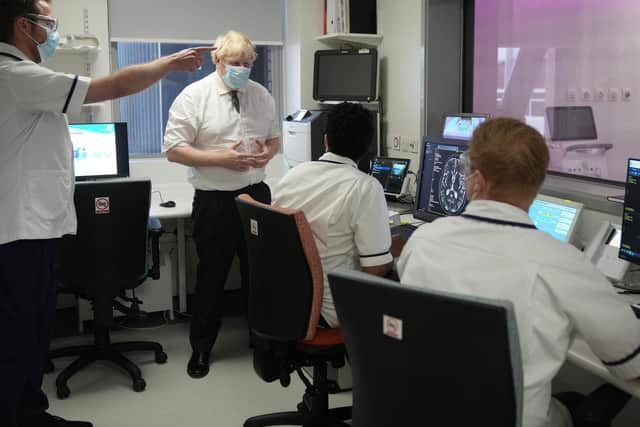Yorkshire's pioneering medical technology industry 'must be empowered to help levelling up', says IPPR
The report by the IPPR thinktank into stark regional health divides draws a direct link between poverty, education and skills levels and health outcomes – highlighting that Hull has had the total wealth per person of Richmond upon Thames in London – with its child poverty rate five times higher.
The researchers found “behavioural” risk factors to health such as smoking, obesity and alcohol consumption were the highest in Hull of all the places in the country they looked at.
Advertisement
Hide AdAdvertisement
Hide AdIn addition to calling for a New Zealand-style public health budget to allocate £35bn towards closing health disparities, the report also highlights “missed opportunities” in investing on research and development across the country.


The report states: “A significant proportion of public money is invested in the South of England and, specifically, the ‘golden triangle’ of London, Cambridge and Oxford. Only a very small amount of health research investment goes to the North of England, the Midlands, Wales, Scotland or Northern Ireland.
“This is not because of a lack of potential in these places. Indeed, despite the lack of public money, many regions have developed exciting niches. Local authorities in North and West Yorkshire are pioneers in medical technology.
“Almost 10 per cent of patents submitted in the UK originate in the Leeds city region, and the region produces as many as 12,000 MedTech graduates per year.”
Advertisement
Hide AdAdvertisement
Hide AdThe report added: “These are the kind of hubs that the Government should be empowering to compete globally.
“There is an opportunity to create productive, high-growth sectors, and to translate that prosperity into better lives and better health for people. R&D is key to spreading productivity – a key challenge for the UK economy since the 2008 financial crash.
“We recommend significant government efforts to empower the places where there are high levels of health need, to scale their health R&D sectors.
“This should mean direct investment in these places, to help ‘crowd-in’ private sector investment. It should also mean significant investment in infrastructure, including skills, patient capital, transport and digital connectivity.”
Advertisement
Hide AdAdvertisement
Hide AdThe report more widely identifies clusters of areas of England where multiple disadvantages are conspiring to drive down health outcomes and prevent life expectancy from growing.
Cities in the North, the Midlands and on the coast were identified as areas where public health was particularly influenced by a combination of material conditions and lack of health infrastructure.
“The analysis shows if health outcomes nationally matched those seen in parts of the country where health is traditionally best in London and the Home Counties, average life expectancy could rise by two years.”
The IPPR also said that the report’s findings contradicted Prime Minister Boris Johnson’s comments at the Tory conference suggesting that the health disparity between Ribble Valley and Blackpool was due to “some royal jelly”, but was down to differences in relative wealth, poverty, education and skills levels.
Advertisement
Hide AdAdvertisement
Hide AdIPPR senior research fellow Chris Thomas said: “While the Prime Minister and his Health Secretary have recognised that stark health disparities exist in this country, they are currently failing to address the underlying causes.
“It’s not a ‘royal jelly’ that explains the difference between Blackpool and Ribble Valley – it’s poverty and multiple disadvantage.
“Our analysis shows the material conditions of the places we live – and our exposure to poverty, wealth inequality, unemployment, poor education, worse early years development or lower access to local public health services – combine to undermine the health of many people in our country.
“This has a social cost, and an economic cost, and runs counter to the Government’s ‘levelling-up’ rhetoric.”
Advertisement
Hide AdAdvertisement
Hide AdA Department of Health and Social Care spokesperson said work is taking place to improve health inequality.
“We are absolutely committed to levelling up health and the new Office for Health Improvement and Disparities will support people of all ages, in all areas of the country, to live healthier lives and prevent illness.
“The Government is supporting Directors of Public Health and their teams to improve public health and wellbeing by making over £10bn available to local councils to address the wider costs and impacts of Covid-19 as well as increasing the local authority public health grant to over £3.3bn this year.”
Read more:
Support The Yorkshire Post and become a subscriber today. Your subscription will help us to continue to bring quality news to the people of Yorkshire. In return, you'll see fewer ads on site, get free access to our app and receive exclusive members-only offers. Click here to subscribe.